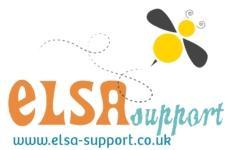What is ELSA?
There will always be children and young people in schools facing life challenges that detract from their ability to engage with learning. Some will require greater support to increase their emotional literacy than others.

What is ELSA?
There will always be children and young people in schools facing life challenges that detract from their ability to engage with learning. Some will require greater support to increase their emotional literacy than others.
ELSA is an initiative developed and supported by educational psychologists. It recognises that children learn better and are happier in school if their emotional needs are also addressed.
At Woods Foundation School we understand the importance of supporting with the emotional needs of our children. We have invested heavily in having many of our staff as qualified Emotional Literacy Support Assistant (ELSA).
Our ELSA has been trained by Educational Psychologists to plan and deliver programmes of support to pupils who are experiencing temporary or longer term additional emotional needs. The majority of ELSA work is delivered on an individual basis, but sometimes small group work is more appropriate, especially in the areas of social and friendship skills. Sessions are fun, using a range of activities such as games, role-play with puppets, or arts and crafts. ELSA sessions take place during the school day in a quiet place away from the classroom, which provides a calm, safe space for the child to feel supported and nurtured.
A further benefit of having an ELSA in our school is the ELSA-informed practices that take place in all of our classrooms when working with the entire class.
In ELSA we aim to provide support for a wide range of emotional needs:
How Does ELSA Work?
Children are usually referred for ELSA support by their Class Teacher, Senior Leaders or the SENDCo. Every half term, referrals are reviewed to identify and prioritise which children require a weekly programme for the next 6-8 weeks. With the programme aims in mind, we then plan support sessions to facilitate the pupil in developing new skills and coping strategies that allow them to manage social and emotional demands more effectively.
Supporting – Not Fixing
Remember, an ELSAs is not there to fix children’s problems. What we can do is provide emotional support.
We aim to establish a warm, respectful relationship with a pupil and to provide a reflective space where they are able to share honestly their thoughts and feelings.
It needs to be appreciated that change cannot necessarily be achieved rapidly and is dependent upon the context and complexity of the presenting issues. For children with complex or long-term needs, it is unrealistic to expect ELSA intervention to resolve all their difficulties, however support will be designed to target specific aspects of a child’s need. Training and development of ELSAs is an ongoing process and wisdom is required to recognise when issues are beyond the level of expertise that could reasonably be expected of an ELSA.
Mental Health & Wellbeing (PSHE) (ELSA)
Mental health is a state of well-being in which every individual realises his or her own potential, can cope with the normal stresses of life, can work productively and fruitfully, and is able to make a contribution to her or his community. (World Health Organization)At our school, we aim to promote positive mental health for every member of our staff and all of our pupils. We pursue this aim using both whole school approaches and targeted approaches aimed at vulnerable pupils. By promoting positive mental health, we aim to recognise and respond to mental ill health, and promote a safe and stable environment for pupils affected – directly or indirectly – by mental ill health.

Children can talk to a Child Line counsellor 24 hours a day about anything that is worrying them by ringing 0800 11 11 or in an online chat at https://www.childline.org.uk/get-support/1-2-1-counsellor-chat/
Woodborough Wood's Foundation C of E Primary School
Lingwood Lane
Woodborough
Nottinghamshire
NG14 6DX
0115 965 2136